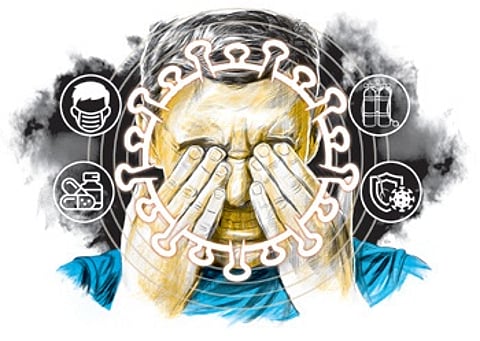Presbyopia typically affects people in their 40s
The performance of visual functions decreases as one ages. With at least two billion people affected globally, presbyopia is the world’s leading cause of visual loss. One-third of India’s population is affected by vision related issues due to ageing. Hemant Kumar Rout discusses with Dr Sandip Kumar Sahu, associate professor of ophthalmology, AIIMS, Bhubaneswar, about presbyopia and claims on the new eye drop PresVu that it will eliminate the need for reading glasses. Edited excerpts:
What is presbyopia and how is it diagnosed?
Presbyopia is an age-related condition where the eye’s lens becomes less flexible, making it difficult to focus on objects close to the eye. It typically starts to affect people in their 40s, and continues to degrade till 65. The symptoms develop gradually. People should consult an eye specialist when they have to hold a reading material farther away to see the letters clearly, blurred vision at normal reading distance, and eyestrain or headache after reading or doing work closer to eyes. The symptoms are more severe if the person is tired, or in an area with dim lighting. Presbyopia is diagnosed with a comprehensive eye exam that includes a visual acuity test, refraction test, and sometimes a near vision test.
The eye doctor assesses how well one can see at different distances, and determines whether there is a need for reading glasses or other corrective lenses.
What are the current methods of treating presbyopia, and how is the performance of existing eye drops?
Presbyopia is treated by prescribing convex lenses to help with clear and comfortable near vision. The difference between the distance correction and the power needed for near vision is called ‘add,’ which increases with age. The most common treatment is reading glass. Bifocals, progressive lenses, and multifocal or monovision contacts can also improve both near and distance vision, but are not applicable in all cases. Some treatments include procedures like LASIK, conductive keratoplasty, or lens implants that enhance near vision by modifying the cornea or replacing the lens.
Mumbai-based Entod Pharmaceuticals has developed PresVu eye drop, which it claims will eventually eliminate the need for using reading glasses. Will it actually be a game changer?
As the product is yet to be available in the market, its exact composition is unknown. It is still under evaluation, and its effectiveness and safety profile are not fully established.
If it is pilocarpine, then it is already being prescribed for presbyopia in a few countries, and can also be used for treating acute angle closure glaucoma.
How is PresVu different from Vuity, which is now available in the market? What are the pros and cons of this new eye drop? Will there be any side effects?
Vuity, a 1.25% pilocarpine solution, reduces pupil size to improve near vision in presbyopia and lowers eye pressure by reducing fluid in the eye. It’s generally safe and effective, but side effects can include headaches, brow aches, blurred vision, and eye irritation.
The specific pros and cons of PresVu compared to Vuity aren’t fully known yet.
Is presbyopia preventable? What would you suggest people follow to correct age-related vision loss?
Presbyopia is a natural part of ageing and is not preventable. However, maintaining eye health through regular check-ups, managing overall health like controlling blood sugar and blood pressure, and protecting eyes from excessive UV exposure can support overall vision health.
This can be managed by presbyopic spectacles, and temporarily with pilocarpine, which is a short-acting drug that needs repeated doses. An ophthalmologist should be consulted before using this.
Regular eye exams to track changes in vision, using appropriate corrective lenses as prescribed, staying informed about new treatments and discussing options with an eye care professional will help manage presbyopia effectively and keep up with the best available treatments.

